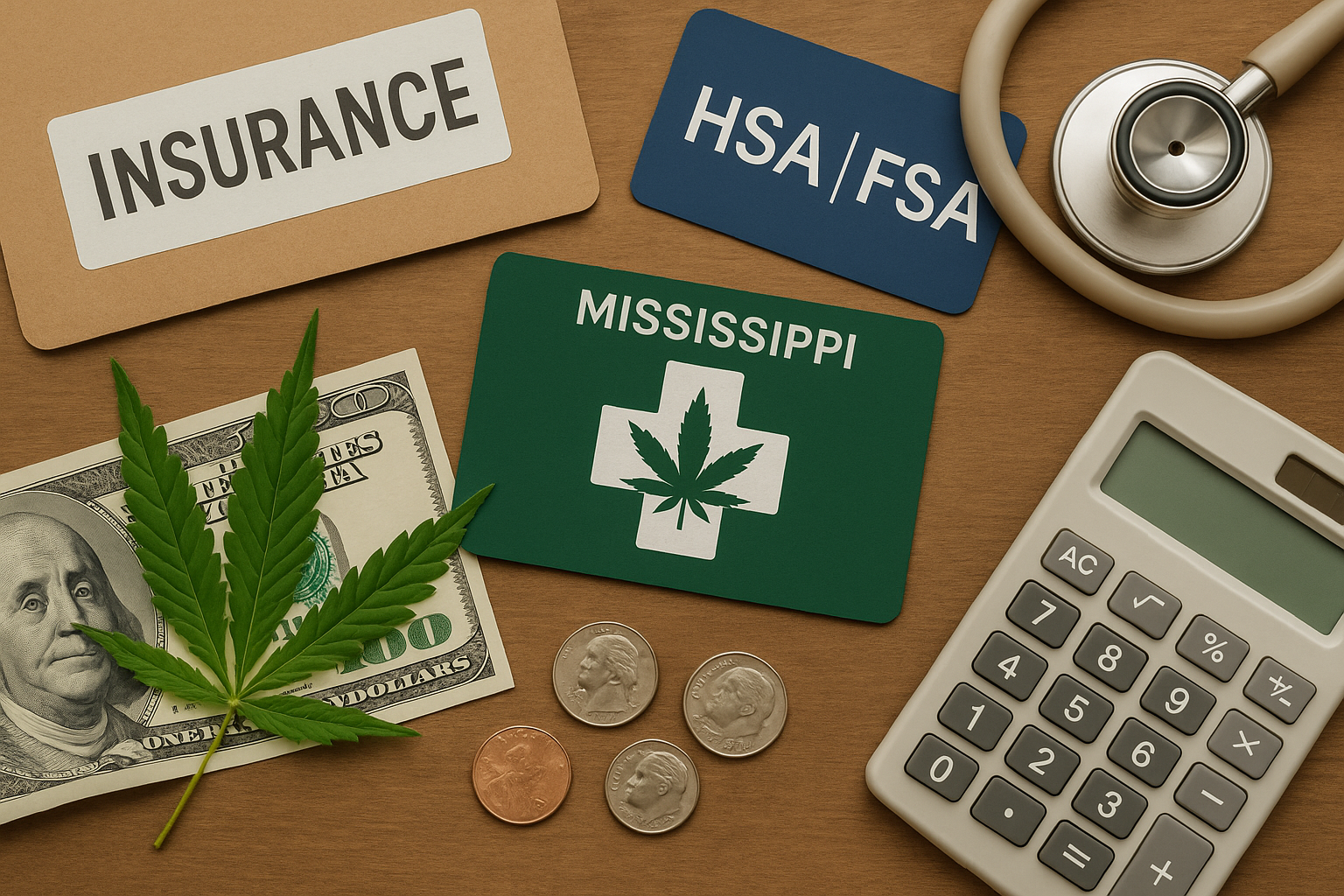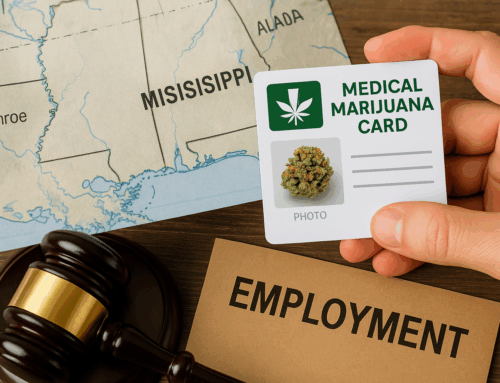Understanding how your medical marijuana use affects your health insurance, savings accounts, tax benefits, and out-of-pocket costs
The Mississippi medical marijuana (MMJ) is on the rise. The increasing number of individuals is willing to take cannabis as a way of managing chronic pain and anxiety, among other medical issues. Medical cannabis may be soothing, but it also brings along some new questions. How does it impact your health insurance plan? Can you use cannabis payment out of your Health Savings Account(HSA) or Flexible Spending Account(FSA)? What about tax benefits and deductible amounts? Let’s explore these questions in easy words, so you can make wise choices, save money, and understand the rules clearly.
Medical Marijuana and Insurance: The Basics
One should be aware of the functioning of health insurance and medical marijuana in Mississippi. Insurance wont cover medical marijuana. Insurance, such as Medicaid and Medicare, will not assist in covering cannabis purchases when you purchase it using a medical card. This is owed to the fact that cannabis is a drug that is prohibited in the federal legal system.
In case you require medical marijuana for your qualifying conditions, you need to pay out of your pocket. Moreover, you can find out what costs your insurance will cover and look for other ways to save money.
What Is a High Deductible Health Plan (HDHP)?
In the case of a high-deductible health plan (HDHP), your monthly premium tends to be lower. Still, your medical treatment expenses will be higher until the day your insurance begins to pay. To meet the cost, you must drop a larger amount out of your pocket before your insurance kicks in, which is a larger deductible.
The benefit of HDHPs is that they allow you to enjoy a health savings account (HSA). HSAs have a preferential tax status, which may benefit individuals who want to decrease their income tax and save on medical care.
Health Savings Accounts (HSA)
A Health Savings Account (HSA) allows you to save money from your paycheck or personal account tax-free. This money can be used to pay the qualified medical costs. If you follow the rules, you can save on income tax now and pay no tax when you spend it on approved medical care.
Nevertheless, this has particular rules to be taken:
- To contribute to an HSA, you must have a high-deductible health plan (HDHP).
- Contributions to your account have a limit as to how much money you are allowed to contribute every year.
- -You should only use your money for qualified medical expenses.
So, now we are going to discuss these notions further.
Annual Contribution and Catch-Up Contribution
In 2025, people can contribute about $3,850 a year. Families can pay around €7,750 per year.
If you are 55 or over, you can add $1,000 as a catch-up contribution. That means people 55 or older can put in up to $4,850, and families can put in up to $8,750.
When you donate, it reduces your taxable income. The funds are tax-free to grow, and you use the funds to pay the qualified expenditures.
Qualified Medical Expenses
And here is where it counts. IRS stipulates what would be considered a qualified medical expense. These include:
- Medical care includes doctor visits and treatments.
- Prescription drug costs.
- Dental care, such as cleanings, fillings, or braces.
- Vision care, like eye exams, glasses or contacts.
- A few long-term care costs could be circumstantial.
- Copays, coinsurance, and deductible amounts are included in your insurance plan.
What doesn’t matter? Medical marijuana. A doctor might say you should use it, but you can’t use HSA money to pay for it.
Why MMJ Doesn’t Qualify as a Medical Expense
It can be felt unfair. You possess a medical marijuana card, and a physician informs you that you can benefit from using cannabis to make you feel better. Yet you cannot pay it with your insurance or savings. Why not?
That is due to the Federal statute. Medical marijuana has been legalised in Mississippi, although it remains illegal under federal law. This implies that federal regulations do not consider it as medicine. Therefore, you cannot afford insurance to pay for medical marijuana.
What Counts as Eligible Care Services?
Even if you cannot pay for medical cannabis with your HSA or FSA, these accounts still have value. You can use them to cover many health-related costs.
Medical Care :- Spending on doctor visits, therapies, procedures, and medical treatments—anything deemed non-cosmetic and medically necessary—can be paid for with HSA or FSA.
Prescription Drugs :- If your doctor prescribes medication, you can use your savings accounts or insurance to help you pay for it.
Dental Care :- Frequent check-ups, cleaning, oral procedures, and braces are likely an expense.
Vision Care :- This can be eye tests, contacts, glasses on prescription or treatment of eye diseases.
Long Term Care:- The following are some expenses that may be considered qualified if you have long-term health requirements. The requirements may be complicated, so consult a tax counsel or care planner if you require financing for long-term care costs.
These qualified medical expenses make HSA and FSA money worth saving up for.
How to Save Money Smartly When You’re an MMJ Cardholder
Now that you know the rules, how can you save money and manage your medical expenses well?
Use HSA/FSA On Everything Else Which Qualifies
Max out your HSA contributions for the tax benefits and long-term growth, especially if you have a high-deductible health plan. Qualify medical and dental expenses throughout the year using your FSA funds so you can keep a very close eye on how they are spent.
MMA and MMJ are two different things, so keep them separate.
Since the purchases of the MMJ are a responsibility of your own money, monitor it in an independent budget. This way, you can see how much you are spending on cannabis as opposed to everything you spend your money on.
Lower Pocket Expenses for Other Care
With HSA or FSA you can use on approved services, leaving more of your money in your cash pocket to help with MMJ purchases and your day-to-day life.
Grab Dispensary Deals
There are also dispensaries with discounted rates for veterans, seniors, and cardholders. Ask them whether they have loyalty/bulk-discount schemes. Purchasing in bulk but within the limits of the law can get around the cost per dose; make sure you are within the legal means.
Compare Prices and Quality
Not all dispensaries charge the same. Shop around, check online menus, and compare prices and product quality before you buy.
How MMJ and Insurance Intersect—or Don’t
Does being an MMJ cardholder affect your health insurance? The response is: “It depends. Usually not, but there are exceptions.”
- Insurance plans on their own will not even drop your coverage just because you have a medical marijuana card.
- MMJ is not a reason they are inclined to deny claims unless your insurer, in particular, has stringent regulations, which is unlikely.
- The one thing that you should consider is your employer’s drug policy, particularly in safety-sensitive work. Although the drug is legal to use medically, your employer could not be tolerant, and chances are high that you could lose your job at the workplace.
So remember that your health insurance stays intact, but your job policies might still affect you.
Final Thoughts
Mississippi medical marijuana cardholders face financial challenges. Insurance won’t cover medical marijuana, and HSA or FSA funds can only be used for eligible services. Federal laws also exclude it from insurance and tax benefits.
To stay healthy and financially secure:
- Use your HSA/FSA to the utmost.
- Eligible costs should be maximised.
- Medically pay out of pocket.
- Be cautious of every spending.
- Make good use of the discounts available.
- Know the laws of employment and tax rates of the IRS.
With clarity and planning, you can manage your health needs, save money, and comply with Mississippi law and federal rules.





